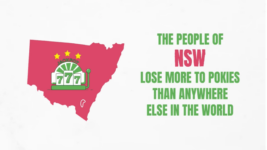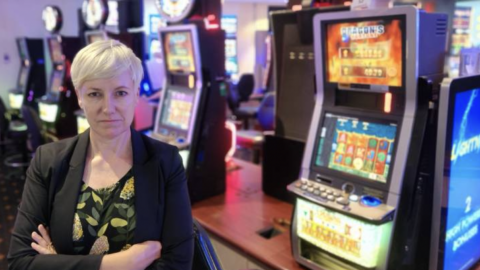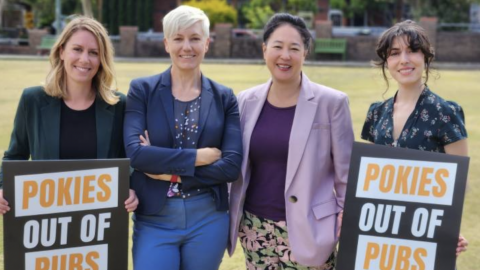Pokies Out of NSW Pubs and Clubs, Says Greens MLC Faehrmann, as Labor Trial Set to Fail

NSW Greens MLC Cate Faehrmann launched her party’s plan to phase out pokies from pubs and clubs on 5 December. And when the Greens gambling harm reduction spokesperson did, she made the announcement from the Petersham Bowling Club, which ditched the machines 15 years ago.
The Pull the Pin on Pokies campaign not only provides for the eradication of poker machines from NSW venues, but it aims to end the agreements that the Liberals, the Nationals and Labor enter into with ClubsNSW prior to state elections to ensure future reforms are blocked.
The gambling reform policy further calls for an end to political donations made by clubs, for the establishment of a pokie supertax and for a reduction of maximum bets to $1: all with the aim of reducing the social cost of pokies by about $87 billion over the next decade.
Faehrmann’s plan also includes the introduction of the mandatory cashless gaming card, which NSW premier Dominic Perrottet proposed in November, in response to a recommendation made in the NSW Crime Commission’s report on money laundering via poker machines in state pubs and clubs.
Shirking on the issue
The gambling industry wields enormous influence over politics in this state, according to Faehrmann.
Indeed, there are rumours circulating that the reason a scandal broke involving Perrottet having worn a Nazi uniform to his 21st birthday was due to opposition to the gambling card proposal coming from within his own party.
Since Perrottet came out with the gambling card and the Greens put their broader plan for change on the table, NSW Labor has remained resistant to gambling reforms. However, on Monday, likely next premier of NSW Chris Minns announced his party was joining the calls for gambling reform.
The Labor package involves a ban on clubs making political donations, a reduction in the number of state pokies, cash input limits reduced down to $500 per machine and the party also supports a trial of the cashless gaming card but only on 500 machines statewide.
Faehrmann considers Labor’s late entry into the reform club to be something of a bluff though, as she asserts that confining the trialling of the card to a limited number of machines is set up to fail, as gamblers will avoid using these, and on assessment, the finding will be that the scheme didn’t work.
Social harms
Pubs were only permitted to introduce poker machines in April 1997, and it didn’t take long for the once vital live music scene in this state to be killed off as a result. And Faehrmann points out that the constituency is now led to believe that we can’t do without pokie revenue.
Despite the claims that the tax coming from poker machines is shoring up the state budget, the fact is that the people of NSW lose more to pokies each year than any other place on Earth, with the average user losing $4,500 annually.
Sydney Criminal Lawyers spoke to NSW Greens MLC Cate Faehrmann about the government habit of not including the social cost in the poker machine equation, the details of the Greens plan to do away with them and why she’s calling foul on Labor leader Chris Minns’ newly released reforms.

The NSW Greens have launched a campaign to get poker machines out of pubs and clubs. So, Cate, why target the pokies now?
The Greens have been campaigning on this issue for a very long time. We’ve called for $1 bet limits. We’ve called for pokies out of pubs for years.
So, we’ve done it for a long time. But with the NSW Crime Commission report, the Bergin inquiry and the Bell inquiry into Star Casino, a light has been shone on gambling in its entirety, including criminal behaviours.
The NSW Crime Commission’s report in particular really brought to the fore the issue with pokies in this state, which has seen the industry getting away with harmful activities for far too long.
It’s only since the NSW Crime Commission report came out that the public has become aware of the agreement that ClubsNSW makes with the Liberals, the National Party and Labor, in some form, so they don’t clamp down on the industry.
The social costs of gambling aren’t brought into the equation, when we talk about revenue coming into the state.
In Victoria, there is the Responsible Gambling Foundation, which is a body that was set up through government money. It released a report into the social costs of gambling a couple of years ago.
This inquiry found that every dollar lost to the poker machines results in a $1.20 social harm. That’s from loss of work, productivity, mental health issues, financial problems and family breakdowns. The list goes on.
The NSW budget is predicting revenue from the gambling sector will increase, which is disturbing in itself. And we have extrapolated from these figures that the harms caused by gambling will cost NSW around $9 billion this year, because of what people are losing to gambling.
So, $7.6 billion will be lost as a result during the next financial year. The harms will cost $9 billion, and NSW is predicted to receive about $2 billion in pokie taxes.
We’ve pulled this together, because the government is not measuring what it’s costing the individuals who are affected by gambling in NSW. The figure is around 800,000 to 1.2 million people affected. It’s massive.
These aren’t just people who are identified as problem gamblers, as they go on to impact about nine to ten others. It’s extraordinary.
This isn’t being factored in when they say that the revenue is being brought into the state. They say that gambling revenue is brought into the state as if the activity isn’t impacting the community.
So, it’s time. The political zeitgeist is now looking for change at a level never seen before.
The Greens have produced a plan to phase out poker machines from pubs and clubs. What does it involve? And what sort of changes do you expect it will bring?
We’ve tried to address two of the key arguments that both politicians and the clubs say are the reasons why the pokies can’t be phased out.
The first is that it raises a lot of money for the state budget, something like $2 billion each year and rising.
The second thing is that clubs provide such an essential service, in terms of community grants and everything else they provide to the community.
Our plan has a range of different measures that ultimately lead to the phasing out of poker machines from pubs in five years and clubs in ten years.
There are a number of measures to be brought in beforehand, including $1 bet limits and introducing the mandatory cashless gambling card.
In terms of the two arguments as to why pokies can’t be phased out, our plan is to firstly increase taxes on poker machines, which is essential. It needs to start soon.
An agreement that has been established with the major parties, which Labor hasn’t signed but has agreed to in policy, says that the parties won’t increase taxes on poker machines, which means that the average tax upon poker machines in clubs is around 28 percent.
In Victoria, it’s more than 45 percent.
We believe it should be a flat tax of 60 percent on every poker machine across all pubs and clubs, and it would increase by 5 percent per year, which would bring an additional $3.4 billion in revenue over four years.
The reason that’s important is that the additional revenue becomes a poker machine reparations fund that replaces the pub grants scheme.
The whole notion that clubs pay all this money into the community is a defence that is brought around every time, which suggests they are essential, and they can’t be gotten rid of.
A poker machine reparations fund can provide $100 million a year, which goes into a community fund, and it can help with gambling harm reduction. So, there’s a windfall in raising revenue by increasing the taxes.
There are still poker machines in casinos. A lot of people say they shouldn’t be in pubs. Western Australia doesn’t allow them in pubs and clubs, and they still have a thriving industry.
It’s only a relatively new phenomenon that we have poker machines in pubs. And it’s become this thing where we’re not supposed to be able to suggest change, so that we no longer have them.
But a lot of the community is behind the change, and it can happen.
And the rollout of poker machines happened in the 1990s?
That’s right. In the past couple of days, Dominic Perrottet said in response to Bob Carr, that this was introduced under Labor.
There’s quite a strong history with some of the Labor clubs then installing a lot of machines and becoming Labor donors, like the Randwick Club for example.
Of course, Labor fixed this issue with its announcement on Monday. And I’m glad to see that, because the Greens called for that last year. We had an amendment to a bill last year, calling for that. But the major parties didn’t support it.
So, I’m very pleased to see that in the Labor announcement. It was a loophole in the donations laws that allowed not-for-profit entities to donate, which meant clubs with poker machines could donate substantial amounts.
The NSWCC report, along with two damning reports into Sydney’s Star Casino, found that adequate measures to prevent money being laundered through the machines aren’t being applied.
NSW premier Dominic Perrottet has gone on to call for a cashless gaming card to be issued to those who play pokies in this state.
You support this initiative. So, why is it of benefit?
The mandatory cashless gambling card would prevent a lot of the money laundering that we’re seeing in clubs. The application for the card would be similar to others, like credit cards, and it would be a statewide card that applies to you.
There would be limits on the card, in terms of what you can bet on. People could apply to increase their limit.
If every machine in the state had a cashless gambling card, it would be difficult to see how the proceeds of crimes would go through those machines.
Similarly, with people experiencing gambling harm and finding it very difficult to control their pokies use, they could set limits. They would be able to set limits per day and not go over them.
There are also restrictions and exclusion registers. But I have spoken with families that have told me that they have loved ones on exclusion registers that continue to be able to get into venues. So, I’m not sure whether these restriction registers are working as they’re supposed to be.
But, having said that, we do support a statewide exclusion register that covers all venues. The issue with it now has been the distance. There are self-exclusion zones regarding particular areas, and it doesn’t cover the whole state or all venues.
We’d create such a statewide exclusion register covering all venues and Labor came out yesterday and said the same as well.
So, there’s a state election in March. It’s likely a Labor government will be elected, and it now seems that party is embracing gambling reform. So, what’s the next step in getting the Greens pokie initiative over the line?
We need to examine the influence of the gambling industry on our democracy, to be honest.
We’ve seen the various tactics that have played out. Victor Dominello lost the portfolio as he was probably taking ClubsNSW on too much. And Labor has held off for so long.
Plus, ClubsNSW gets these agreements signed off on beforehand, which is just extraordinary. People say they don’t know any other body or industry that does that. It literally stops government from legislating reform in a particular area.
So, there needs to be some sort of inquiry into the influence of gambling on our democracy.

And lastly, Cate, now that Labor has come to the table on gambling reform, how does its new approach affect what the NSW Greens have put on the table?
The issue with Labor’s new approach is that I’m not convinced they’re actually supporting a mandatory statewide cashless gambling card.
The trial sounds like it’s being set up to fail. It’s only on 500 machines, out of somewhere between 86,000 to 92,000 in the state.
My concern with this is that if you’re money laundering, experiencing gambling harms or you’re addicted to these machines, you’re not going to put your money into the machines subject to the card.
The 500 machines will see a drastic revenue loss. And the independent expert panel set up to see how the trial goes, will surely find that it resulted in job losses and that the industry will suffer the impacts of this.
In his press conference, Chris Minns talked about the economic impact in the industry. But if he sets it up on 500 machines, that’s what’s going to come back: that everybody avoided it and the machines experienced a significant decline in income, and if that occurs across all NSW machines, the industry won’t be able to survive.
It’s been set up to fail. I don’t think they’re serious. ClubsNSW has ticked off on this, with some good things involved in the policy, such as on political donations and the external advertising of VIP lounges to be banned, which we’ve been calling for. These are good.
The $500 maximum deposit into a machine for a play, again, we had that in our plan, but for Labor, it only applies to new machines, when they’re replaced by the clubs and pubs.
So, what will the clubs and pubs do? They won’t replace those machines that can receive up to $7,500 to $10,000 in any one play. Why would they?
So, they’ve come out saying that they’re going to do this, but when you look at the details, it looks like they’re trying to pull the wool over the public’s eyes.
But it’s good that people are focusing on this, because everybody understands the issue to the point now that they’re not going to be able to get away with spin.
The average person who uses poker machines loses $4,500 per year. It’s extraordinary compared to every other state.
And the communities who are losing the most are those that can least afford it. They are the lowest socioeconomic local government areas in Greater Sydney.
The government is clearly taxing on the misery of others, and something needs to be done about it.







